[…] post The Biblical Boots of the Papacy appeared first on The Catholic […]
A blog for Catholic men that seeks to encourage virtue, the pursuit of holiness and the art of true masculinity.
The Biblical Boots of the Papacy
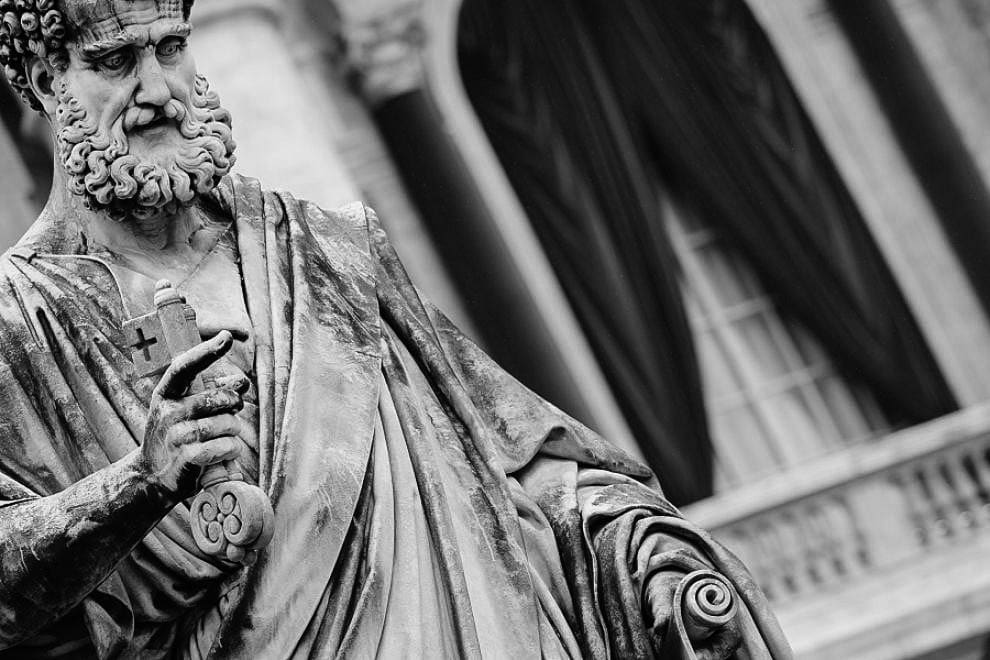
Do you remember that one scene in Toy Story when Sheriff Woody, unsure of his vocation, doubts his authority over the rest of the gang? Woody’s been insulted and abandoned, his motives have been questioned, threats to domestic security are only getting scarier, and he’s feeling very, well, very human. It’s been a long story, a toy story. Frustrated, Woody sighs and leans over to look at his boots. On the bottom of his right boot, scrawled in permanent ink, is the name Andy. Suddenly, he remembers his purpose. Woody’s deepest identity, his special role among Andy’s other toys, ultimately rests in…Andy.
The metaphor breaks down, as all metaphors do, but I invite you to have fun with it. For some two thousand liturgical years the pope has been insulted and abandoned, his motives have been questioned, the threats to domestic security are only getting scarier, and all the while he’s been feeling very human.  It’s been a long story, a salvation story, and how often has the good pontiff doubted his authority over the rest of the gang? How often has he sighed and leaned over to look at his boots? And when he does, he remembers his purpose. For on the bottom of his right boot, so to speak, is the name Jesus. The pope’s deepest identity as St. Peter’s successor, his special role among Christ’s other apostles, ultimately rests in…Jesus.
It’s been a long story, a salvation story, and how often has the good pontiff doubted his authority over the rest of the gang? How often has he sighed and leaned over to look at his boots? And when he does, he remembers his purpose. For on the bottom of his right boot, so to speak, is the name Jesus. The pope’s deepest identity as St. Peter’s successor, his special role among Christ’s other apostles, ultimately rests in…Jesus.
It’s always a good time to remember the biblical boots of the papacy. Much has been written against the pope—most of it clouded by exaggeration and fabrication. But when we open our Bibles, Peter’s role in salvation history begins to make sense. It comes alive in a way that makes the story more Christ-exulting and soul-nourishing, and we are invited to worship the triune God with grateful and obedient hearts.
Gathering the Tribes
Jesus went up into heaven and left behind something to finish his mission. What did he leave behind? He did not leave behind the Bible or little quips about sola-this and sola-that. Rather, he left behind those loveable and very human men, the twelve apostles. Jesus had carefully chosen them: he went out to a mountainside to pray (Luke 6:12) before he designated them to be his twelve apostles (Luke 6:13), and throughout his public ministry he trained them for this important job. In order to understand the papacy, we first need to remember the significance of the Twelve.
Why twelve? 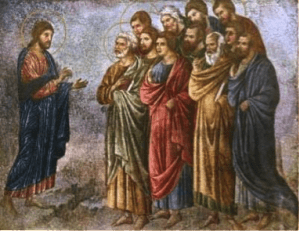 The only answer is because as the new King in the royal line of David, Jesus was gathering the twelve tribes. Richard Bauckham suggests the significance of the Twelve “undoubtedly related to the Jewish hopes for the restoration of all twelve tribes in the messianic age.” The Twelve “correspond symbolically to the twelve princes of the tribes of Israel in the wilderness (Num. 1:4-16).” He concludes: “Jesus’ appointment of the Twelve symbolized the claim that in his own ministry this messianic restoration of Israel had already begun in nucleus.”
The only answer is because as the new King in the royal line of David, Jesus was gathering the twelve tribes. Richard Bauckham suggests the significance of the Twelve “undoubtedly related to the Jewish hopes for the restoration of all twelve tribes in the messianic age.” The Twelve “correspond symbolically to the twelve princes of the tribes of Israel in the wilderness (Num. 1:4-16).” He concludes: “Jesus’ appointment of the Twelve symbolized the claim that in his own ministry this messianic restoration of Israel had already begun in nucleus.”
The Kingdom of God is the Davidic kingdom to the umpteenth degree, the fulfillment of the Old Covenant, what Jesus calls “my Church” (Matthew 16:18). As heaven’s outpost on earth, the Church is not of this world, but in this world. It’s not just a theory. Inaugurated in the present, the Kingdom will be consummated when the Son of Man returns—but until then, it remains present. The Church follows inevitably from the incarnation. She is the social continuation of the incarnation, the hypostatic union of Christ’s divinity and humanity. You could literally touch the body of Jesus, and you can literally touch the Church. Like the Davidic Covenant, but now open to gentiles, this New Covenant is a social reality—a Kingdom.
The continuity between the two covenants
“The New Testament lies hidden in the Old,” wrote St. Augustine, “and the Old is unveiled in the New.” It could also be said that the Church lies hidden in Israel and Israel is unveiled in the Church. In fact, even in the Old Testament the Kingdom of David was a manifestation of God’s own Kingdom: “You think to withstand the kingdom of the Lord in the hand of the sons of David?” (2 Chron. 13:8). Raymond Brown says: “The kingdom established by David was a political institution to be sure, but one with enormous religious attachments (priesthood, temple, sacrifice, prophecy)…It is the closest Old Testament parallel to the Church.”
Now, David and his lineage, the anointed kings of Judah, did not govern alone. As king Solomon appointed twelve officers to rule his kingdom (1 Kings 4:7), so also Jesus appoints twelve apostles to rule his Kingdom after his ascension (Matt. 19:28). The Twelve are his royal cabinet, the body of men authorized to do the King’s will, to represent him as they rule over his New Israel, the Church: “He who hears you hears me, and he who rejects you rejects me” (Luke 10:16). Jesus even gives them the power to forgive sins: “‘As the Father has sent me, even so I send you.’ And when he had said this, he breathed on them, and said to them, ‘Receive the Holy Spirit If you forgive the sins of any, they are forgiven; if you retain the sins of any, they are retained’” (John 20:21-23). Christ planned to bless the world “through their message” (John 17:20).
In choosing twelve men to be the ministers of his Kingdom Jesus knew exactly what he was doing. And the apostles were no fools. They knew that Jesus was the new King David, and that he had gathered the twelve tribes. They knew that they held an office, and that an office left vacant must be filled. After the death of Judas, Peter says to the others: “Let another take his office” (Acts 1:20). There was no debate. And Matthias was chosen to be numbered among them.
The Lord intended his Church to be governed through the apostolic succession. The apostles and their successors—the bishops—are empowered by the Holy Spirit “to care for the church of God” (Acts 20:28). To submit to their authority is to submit to Christ: “He who receives any one whom I send receives me” (John 13:20). Even after Christ’s ascension, the Kingdom was to remain a social reality. Jesus had gathered the tribes.
A peg in a sure spot
The biblical boots of the papacy sink deep into Israel’s history, to Jerusalem and her kings, and to the ministers of the kingdom. And the most important minister of the king was called ’asher ‘al-habayith, the “royal vizier,” or the “Master of the Palace,” (literally the “one over the house”). He was the na‘ar, the steward, of the king’s house (2 Sam. 9:9; 19:18). This was the office given to Joseph by the Pharaoh (Gen. 41:40; 45:8). He was the highest ranking official in the kings royal court, not unlike a prime minister, appointed to manage the day-to-day affairs of the kingdom. Continued in Solomon’s reign on (e.g. 1 Kings 4:6;18:1-5), the office was second only to the king in authority. He governed in the king’s name, and acted for him in his absence. He was not the king himself, but he was the king’s mouthpiece, his right-hand man, the court of final appeal. While the king had many ministers who had power to bind and loose, the prime minister could bind what the others had loosed and loose what the others had bound. He had plenary authority, total veto power.
When you think of the steward, John Bergsma invites us to think of Denethor in Tolkien’s “The Return of the King:” the man in authority second only to the one true king. During the lifetime of the prophet Isaiah, a man named Shebna was the ’asher ‘al-habayith of the kingdom. But he prepared a tomb for himself in the special place reserved for the royal sons of David. Like Denethor, he confused his role with that of the king and was no longer worthy of his office. So God sent Isaiah to Shebna with news that he would be replaced by a more righteous man, Eliakim the son of Hilkiah:
During the lifetime of the prophet Isaiah, a man named Shebna was the ’asher ‘al-habayith of the kingdom. But he prepared a tomb for himself in the special place reserved for the royal sons of David. Like Denethor, he confused his role with that of the king and was no longer worthy of his office. So God sent Isaiah to Shebna with news that he would be replaced by a more righteous man, Eliakim the son of Hilkiah:
Thus says the LORD to Shebna, master of the palace:
“I will thrust you from your office and pull you down from your station.
In that day I will call my servant Eliakim the son of Hilkiah;
I will clothe him with your robe, and gird him with your girdle,
and give over to him your authority.
He shall be a father to the inhabitants of Jerusalem, and to the house of Judah.
I will place on Eliakim’s shoulder the key of the House of David;
he shall open, and none shall shut;
and he shall shut and none shall open.
I will fix him like a peg in a sure spot,
to be a throne of honor to his father’s house” (Is. 22:19-23).
Although this royal steward is mentioned elsewhere in Scripture (e.g. 1 Kings 4:1-6; 18:3; 2 Kings 15:5; 18:18, 37; 19:2), here we learn so much about this unique office. Notice, for example, that the symbol of the prime minister’s authority was a key, as he had the power to open doors as well as to close doors to those who sought the king’s presence. He wore special robes of honor and a girdle, a traditional priestly garment (Lev. 8:7). His office did not cease with his death: it was a chair to be filled by one man succeeding another. He was “a father” to the inhabitants of Jerusalem. He was someone who you can hang a lot of weight on, like a peg in a sure spot.
How firm a foundation
The Church lies hidden in Israel and Israel is unveiled in the Church. Naturally, then, there are parallels between the two. For while Christ appointed twelve ministers, only one of them was made “prime minister.” Only one could bind what the others loose and loose what the other bound. In Matthew 16:17-19 we read: “When Jesus came into the district of Caesarea Philippi, he asked his disciples: ‘Who do people say that the Son of man is?’ And they said, ‘Some say John the Baptist, others say Elijah, and others Jeremiah or one of the prophets.’ He said to them, ‘But who do you say that I am?’ Simon Peter replied, ‘You are the Christ, the Son of the living God.’” The text continues:
“Blessed are you, Simon Bar-Jona!
For flesh and blood has not revealed this to you, but by Father in heaven.
And I tell you, you are Peter, and on this rock I will build my Church,
and the gates of Hades shall not prevail against it.
I will give you the keys of the Kingdom of Heaven,
And whatever you loose on earth shall be loosed in heaven.”
By gathering together the bishops-in-training of his Church to discern his identity, Jesus just held something like the first ecumenical council. As a council, however, they are unable to say. But Simon steps forward with a revelation given to him from the Father: “You are the son of God!” And in the presence of the other ministers, Jesus then appoints Simon to the office of the ’asher ‘al-habayith by paraphrasing Isaiah 22:19-23. 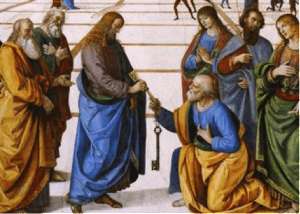 The thematic parallels are strong: “what he opens, none shall shut” and “what you bind on earth will be bound in heaven,” the “sure peg” and the “rock,” the “key of the House of David” and the “keys of the Kingdom of Heaven.” Jesus appointed Peter as the new “master of the palace” in his Kingdom so that he could shepherd the people in his name.
The thematic parallels are strong: “what he opens, none shall shut” and “what you bind on earth will be bound in heaven,” the “sure peg” and the “rock,” the “key of the House of David” and the “keys of the Kingdom of Heaven.” Jesus appointed Peter as the new “master of the palace” in his Kingdom so that he could shepherd the people in his name.
Peter’s modern-day successor—the pope—serves as the current prime minister in Christ’s Kingdom. Like Eliakim, who was a “father to the inhabitants of Jerusalem,” the pope leads as the “Holy Father” of the Church. As in the Davidic kingdom of old, the pope is the King’s premier representative.
Not buying it yet? That’s okay. Let’s take a closer look at the “rock” and the “keys.”
The rock
“On this rock I will build my Church” (Mat. 16:18). In the future Jesus is going to build his Church on a foundation, the fisherman he just named “Rock” (in Aramaic, Cephas). Jesus literally invented this name, and to translate it into Greek, Matthew did something really practical: he took a feminine word, petra, and “masculinized” it so that it could be for the first time a man’s name, Petros, or Peter. The only other men God personally re-names are Abram and Jacob, and every new name represents covenant, headship, fatherhood, and authority. Naming Simon “Rock” may be a reference to Abraham: “Look to the rock from which you were hewn and to the quarry from which you were dug. Look to Abraham your father” (Is. 51:1-2). It may also be a reference to Solomon, who built the temple on a large foundation stone (Is. 28:16). But I think there is something more.
Christ is the foundation of the Church. “For no one can lay any foundation other than the one already laid, which is Jesus Christ” (1 Cor. 3:11). Yet the Church is built on the foundation of the apostles: “you are built upon the foundation of apostles and prophets, Jesus Christ himself being the chief cornerstone” (Eph. 2:20). In Revelation 21:14 we read, “The wall of the City had twelve foundations, and on them the names of the twelve apostles of the Lamb.” Christ is the firm foundation of the Church…yet so are the apostles. Christ is the solid rock on which we stand, yet in Matthew 16:17-19 the Lord says Simon is the “Rock.”
Notice the scene: Jesus gives Simon a new name when he “came into the district of Caesarea Philippi” (Matt. 16:13), a city named in honor of Caesar Augustus situated on an enormous rock wall about 200 feet high and 500 feet long at the foot of Mount Hermon.

From the base of this rock bursts springs that fed the Jordan, an important river in Judaism. On this rock pagan temples and sacrifices were made to Pan and Caesar was worshiped. Beneath it there was the “Cave of Pan,” and inside this cave there was a seemingly bottomless pit considered to be the very gates of hell. The scene is striking. Far out in unclean Gentile lands, on a rock dedicated to the worship of Caesar—this is the spot where Jesus points to Simon and says, “You are Rock…and the gates of hell shall not prevail against it” (Matt. 16:18). The message is clear: Jesus is the one true God, not Caesar, and he was said he would establish his Church, not on the false rock of pagan worship, but on the true rock that is Peter.
Jesus could also have been refering to the Jerusalem Temple’s foundation stone. In Jewish tradition, the Temple was considered to be the center of the universe and the foundation stone, was the crossroads between the physical and the spiritual.
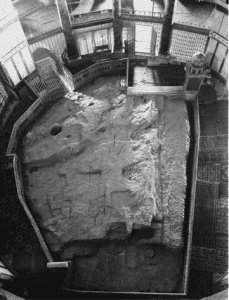
God used this rock to build the world and protect it from the evil spirits beneath and the chaos of hell. It covered the Well of Souls. Jesus redeems this popular tradition. As God built his world on the foundation stone, God will use Peter to build his Church and protect his people from the chaos of hell.
Jesus has gathered the twelve tribes. He has appointed twelve ministers, and one prime minister, one ‘asher ‘al-habayit. There is one King, Jesus Christ, and one Kingdom. He has established it in stone.
The keys
Why does Jesus mention keys? The keys are a symbol of the King’s power, authority, and control (cf. Rev. 22:16; 3:7). In his commentary on Matthew 16:17-19, W.F. Albright says: “Is. 22:15ff undoubtedly lies behind this saying. The keys are the symbol of authority…the same authority as that vested in the vizier, the master of the house, the chamberlain, of the royal household of Israel.” Albright continues:
Eliakim is described as having the same authority in Isaiah; it was Hilkiah’s position until he was ousted, and Jotham as a regent is also described as ‘over the household’ (1 Kings 15:5). Significantly, the first Chaldean governor after the deportation of 586 B.C., Gedaliah, is given the same title on his official seal. It is of considerable importance that in other contexts, when the disciplinary affairs of the community are being discussed (Matt. 18:18; John 20:23) the symbol of keys is absent, since the sayings apply in those instances to the wider circle.
Jesus invests a lowly fisherman with plenary authority in this Church, the “keys to the kingdom of heaven” and the powers to “bind and loose.” And since he promised that his Church would do even greater things than he did (John 14:12), is it any wonder that he provided for its continuation? For the keys symbolize succession. They are an office of authority. And an office left vacant must be filled.
If it was necessary that Judas’s office not be left vacant, what about the prime minister’s office? Did our King mean for his newly established Kingdom to scatter into disorder and chaos after Peter’s death? No, he meant for there to be a continued order and peace through the work of Holy Spirit “even unto the end” (Matt. 28:20)? Our King might have ascended into the heavens, but he left behind his prime minister to rule until his return.
Be not deceived
Our Lord did not abandon us to a book and everyman’s interpretation. He left us a living voice of authority in his apostles. Jesus says to the Twelve: “It is not you who speak, but the Spirit of your Father speaking through you” (Matt. 10:20). The Church cannot teach heresy because God the Father cannot teach heresy. As Christ is “not deceived” (infallibilis: from in– ‘not’ + fallere ‘deceive’) neither will his Church be deceived.
Papal infallibility can be one of the most difficult Catholic teachings, but it is one of the most important. St. Paul can say that the Church is “the pillar and foundation of the truth” (1 Tim. 3:15) because the Lord invested the apostles with the authority to be his living voice, because by giving Peter the keys Jesus took practical steps to ensure that the Church would never be deceived. Like Eliakim, the reliable peg that could bear a heavy load, Peter’s office is a rock, something you can build on. And despite 2000 years of enemies from within and persecution from without, the teaching of the Church has remained pure.
But let’s set the record straight. Infallibility does not mean impeccability. Popes sin. Peter was the first to say, “I am a sinful man!” (Luke 5:8). Popes err in private judgment. What they mutter to themselves when they’re brushing their teeth is not “infallible.” The charism of infallibility also does not “inspire” the pope to teach new doctrines. It is witnessed, rather, when the pope officially and dogmatically teaches the truth “received once and for all” (Jude 1:3). God makes it his official job to “see to it that no one takes you captive by philosophy and empty deceit, according to human tradition, according to the elemental spirits of the world, and not according to Christ” (Col. 2:8). Infallibility is witnessed when the pope teaches truth regarding faith and morals ex cathedra, “from the chair”—a phrase, it turns out, that also has biblical boots.
From the chair
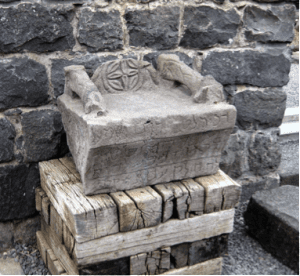
You see, when at last Jesus gathered the tribes he placed above them “the thrones of the house of David” (Ps. 122:4-5), and it’s no coincidence that as soon as Jesus tells his apostles that they will sit on thrones to judge the tribes of Israel (Luke 22:28-30), he immediately turns to Peter and tells him to strengthen the others (Luke 22:31-32), to feed his sheep (John 21:17). What Jesus gives to the apostolic college as a whole—“Whatever you bind on earth shall be bound in heaven, and whatever you loose on earth shall be loosed in heaven” (Matt. 18:18)—he gives to Peter individually: “Whatever you bind on earth shall be bound in heaven, and whatever you loose on earth shall be loosed in heaven” (Matt. 16:19).
“Binding” and “loosing” refers not only to the “throne of honor” of the prime minister, but also to the authority of the rabbis in Jesus’ time. The rabbis had the power to make “binding” and “loosing” decisions about the interpretation and enforcement of the Law. When Jesus’ said of the teachers of the law and the Pharisees, “They sit on Moses’ seat (cathedra). Therefore do whatever they tell you” (Matt. 23:2-3), he was referring to a tradition that goes way back to Exodus 18:13-16. The scribes were the successors of Moses’ teaching authority. By sitting in his “seat” they held the unique authority to interpret the Mosaic law. They could be hypocrites by not practicing what they preached, but their authority remained. In Matthew 16:17-19 Jesus appointed Peter to be the chief rabbi with this same ultimate teaching authority. He is the one who, in partnership with the other apostles, preserves Christ’s message “delivered once for all.”
In this light we can see that Peter’s successors, in doctrinal agreement with the magisterium, may speak ex cathedra. That Paul rebuked Peter for refusing to eat with Gentile Christians at Antioch in order not to offend certain Palestinian Jews does not disprove infallibility (Gal. 2:11–16). The problem was that, like the hypocritical Pharisees in Moses’ seat, Peter wasn’t following his own teaching.
How can we follow and obey Christ’s teachings, if we do not know what is to believed? When it comes to what is the truth and what is a lie, we must have a firm foundation to build on. We need the chair. And the Holy Spirit guarantees the pope’s infallibility when he speaks from Moses’ “seat,” Eliakim’s “throne of honor,” the Cathedra Sancti Petri.
Peter and the Bible
Let’s quickly survey Peter’s preeminence within the apostolic college throughout the New Testament. There are little hints of it everywhere. For example, St. Paul writes that Christ was raised on the third day “and that he appeared to Cephas and then to the twelve…” (1 Cor. 15:3-5). But there are also really big examples too. For example, Peter announces that Judas’ office must be filled (Acts 1), Peter preaches the first sermon (Acts 2), Peter performs the first miracle (Acts 3), Peter speaks in Solomon’s portico, Peter speaks before the Council (Acts 4), and it is Peter who Paul must see when he visits Jerusalem (Gal. 1:18). Peter decides to confirm the first Samaritans (Acts 8) and to baptize the first Gentiles (Acts 10). He alone could have stood up and announced the final decision of the first council (Acts 15). Numerous scholars have speculated that Peter is likely Mark’s primary source for the Gospel—and Mark is the primary source for Matthew and Luke. Peter alone is the holy father of the new family of God, the keeper of the keys, the rock, the vicar of Christ. And despite all of this, he remains nothing compared to his King. For God gave Peter this office despite his obvious personal deficiencies so that God alone would get the praise.
According to the Bible, the Bible is not a sufficient guide apart from the apostolic tradition. St. Paul tells the Corinthians, “Maintain the traditions even as I have delivered them to you” (1 Cor. 11:2). He tells the Thessalonians, “Stand firm and hold to the traditions which you were taught by us, either by word of mouth or by letter” (2 Thess. 2:15), and “Keep away from any brother who is living in idleness and not in accord with the tradition that you received from us” (2 Thess. 3:6). He commands Timothy, “What you have heard from me before many witnesses entrust to faithful men who will be able to teach others also” (2 Tim. 2:2). Notice that he mentions the first four generations of apostolic succession—his own generation, Timothy’s generation, the generation Timothy will teach, and the generation they will someday teach. So it was that the apostolic tradition was passed down after the deaths of the first apostles. Jesus did not establish a Bible people could use as an excuse to form a thousand little clubs but a Kingdom. And the Church is as Petrine as it is apostolic, a two-thousand year succession of truth and unity.
So it is that the early Church Fathers acknowledged the leadership and prerogatives of Peter. Dionysius of Corinth, the twelfth pope, wrote in AD 170: “You have also, by your very admonition, brought together the planting that was made by Peter and Paul at Rome.” In AD 200, Tertullian says with joy: “Was anything withheld from the knowledge of Peter, who is called ‘the rock on which the Church would be built’ with the power of ‘loosing and binding in heaven and on earth’?” Cyprian of Carthage wrote in 256: “Would heretics dare to come to the very seat of Peter whence Apostolic faith is derived and whither no errors come?” Augustine of Hippo summed up the ancient faith succinctly: “Rome has spoken; the case is closed.”
These very few quotes barely scratch the surface of the patristic witness to the pope’s primacy in the apostolic college (Stephen Ray or William Jurgens are good beginning resources), a primacy that does not belittle or relegate the other bishops, but blesses and encourages and serves them.
True, the papacy has undergone development through the centuries, but it has not departed from the essential components given it by the Lord, acknowledged by his contemporaries, and accepted by the early Church. The papacy was God’s original idea, established for the good of his Church, for the glory of the Trinity’s great name. For Peter’s successor is still what Christ said he would be: a rock. When the pope solemnly defines an issue, we can join the fathers of the Council of Chalcedon with joy: “This is the faith of the fathers! This is the faith of the apostles! Peter has spoken!”
Is Christ divided?
So why should we submit to the authority of a lowly fisherman as cocksure and foolhardy as Peter? Because there, on the bottom of his right boot, weather-beaten but scrawled in permanent ink, is the name Jesus. Because the Petrine office was established by none other than Christ himself. Because Peter’s deepest identity and mission ultimately rests in…Jesus.
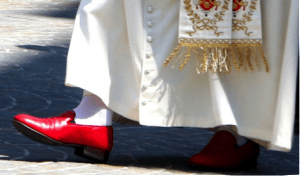 The Kingdom of God is nothing less than the gathered tribes of Israel, the visible Church left behind by Christ to be governed by his apostles. It is a city on a hill that cannot be hidden (Matt. 5:14), and you are either in this city or you are out of it. The Church is the social continuation of the incarnation, the Body of Christ. To those who would remain out of communion with the pope, St. Paul’s question is a challenge: “Is Christ divided?” (1 Cor. 1:13).
The Kingdom of God is nothing less than the gathered tribes of Israel, the visible Church left behind by Christ to be governed by his apostles. It is a city on a hill that cannot be hidden (Matt. 5:14), and you are either in this city or you are out of it. The Church is the social continuation of the incarnation, the Body of Christ. To those who would remain out of communion with the pope, St. Paul’s question is a challenge: “Is Christ divided?” (1 Cor. 1:13).
I’m not asking you to start singing Toy Story’s theme song, “You’ve Got a Friend in Me,” but I am asking you to honestly consider the biblical boots of the papacy. Like Sheriff Woody in Toy Story, the successors of St. Peter might face hard times and be called upon to fight tough battles. They might doubt their authority over the rest of Christ’s flock. But when the good pontiff looks at the bottom of his right boot he finds nothing less than the name Jesus. When we remember the biblical boots of the papacy we are invited to follow and obey our Lord Jesus Christ, to bring glory to the Father in the loving bond of the Holy Spirit. The goal of the papacy is the goal of the Church—the glory of the most adorable Trinity.
—
Tyler Blanski is a writer who once possessed a beard of medieval proportions. Tyler is the author of When Donkeys Talk and Mud and Poetry.
“The New Testament lies hidden in the Old,” wrote St. Augustine, “and the Old is unveiled in the New.”
One of my favorite quotes!